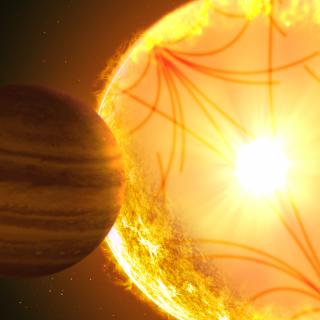Bibcode
Grundahl, F.; Fredslund Andersen, M.; Christensen-Dalsgaard, J.; Antoci, V.; Kjeldsen, H.; Handberg, R.; Houdek, G.; Bedding, T. R.; Pallé, P. L.; Jessen-Hansen, J.; Silva Aguirre, V.; White, T. R.; Frandsen, S.; Albrecht, S.; Andersen, M. I.; Arentoft, T.; Brogaard, K.; Chaplin, W. J.; Harpsøe, K.; Jørgensen, U. G.; Karovicova, I.; Karoff, C.; Kjærgaard Rasmussen, P.; Lund, M. N.; Sloth Lundkvist, M.; Skottfelt, J.; Norup Sørensen, A.; Tronsgaard, R.; Weiss, E.
Referencia bibliográfica
The Astrophysical Journal, Volume 836, Issue 1, article id. 142, 12 pp. (2017).
Fecha de publicación:
2
2017
Revista
Número de citas
78
Número de citas referidas
70
Descripción
We report the first asteroseismic results obtained with the Hertzsprung
Stellar Observations Network Group Telescope from an extensive
high-precision radial-velocity observing campaign of the subgiant μ
Herculis. The data set was collected during 215 nights in 2014 and 2015.
We detected a total of 49 oscillation modes with l values from zero to
three, including some l = 1 mixed modes. Based on the rotational
splitting observed in l = 1 modes, we determine a rotational period of
52 days and a stellar inclination angle of 63°. The parameters
obtained through modeling of the observed oscillation frequencies agree
very well with independent observations and imply a stellar mass between
1.11 and 1.15 M ⊙ and an age of
{7.8}-0.4+0.3 Gyr. Furthermore, the high-quality
data allowed us to determine the acoustic depths of the He ii ionization
layer and the base of the convection zone.
Based on observations made with the Hertzsprung SONG telescope operated
on the Spanish Observatorio del Teide on the island of Tenerife by the
Aarhus and Copenhagen Universities and by the Instituto de
Astrofísica de Canarias.
Proyectos relacionados

Sismología Solar y Estelar y Búsqueda de Exoplanetas
Los objetivos genéricos de este Proyecto son: 1) el estudio de la estructura y dinámica del interior solar, 2) la extensión de dicho estudio al caso de otras estrellas, 3) la búsqueda y caracterización de planetas extrasolares por métodos fotométricos (principalmente mediante el método de tránsitos) y espectroscópico (variaciones en la velocidad
Savita
Mathur